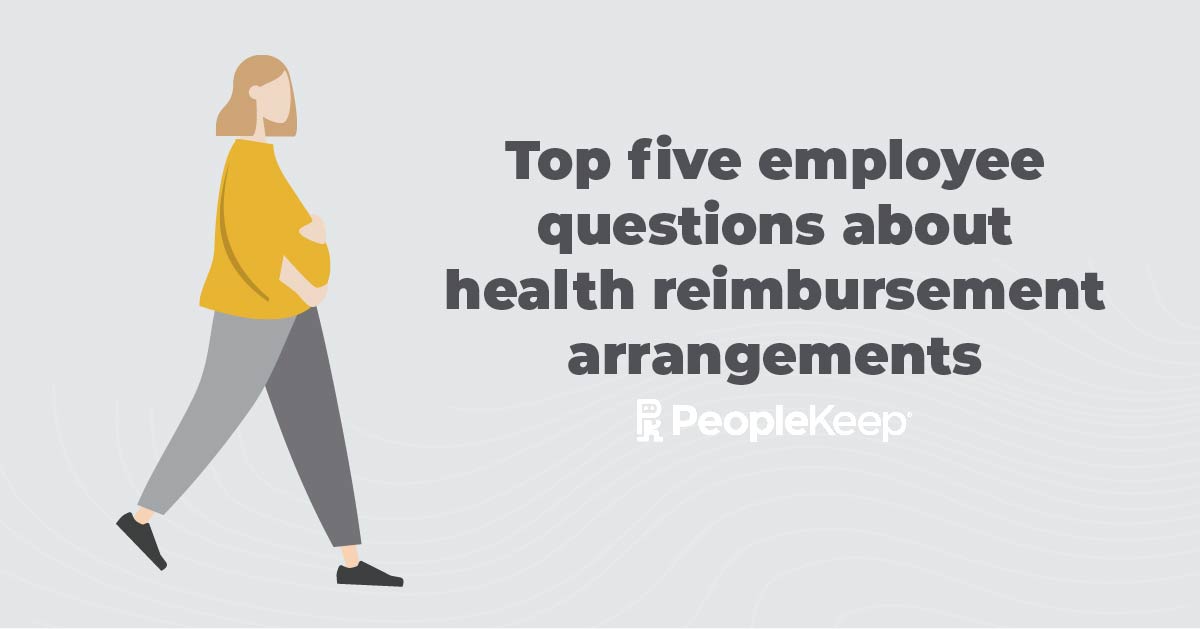Health Reimbursement Account FAQ
By PeopleKeep Team on February 15, 2013 at 10:29 AM
A Health Reimbursement Account, which is another term for Health Reimbursement Arrangement, or HRA, is a type of self-insured group health plan under which an employer makes available a specified maximum dollar amount to employees for the reimbursement of medical expenses and/or health insurance premiums. Here are some FAQs about Health Reimbursement Accounts.
What is the tax treatment of Health Reimbursement Accounts?
Assuming certain IRS rules are met, HRA reimbursements are excludable from employees' gross income under Sections 105 and 106 of the Internal Revenue Code.
How does a Health Reimbursement Account work?
This is how an HRA works:
- A business establishes an HRA Plan with a specified monthly allowances for employees.
- An Employee incurs a medical care expense (e.g. purchase of health insurance or doctor visit).
- The Employee submits documentation for reimbursement to the HRA.
- The HRA plan reimburses the employee tax-free for the expenses subject to the plan terms.
How does an employee benefit from a Health Reimbursement Account?
Health Reimbursement Accounts benefit employees because employees don’t pay taxes on the reimbursed expenses.
What happens to money in a Health Reimbursement Account at the end of the year?
Depending on the HRA plan design, unused HRA dollars during a plan year may roll over to the next plan year.
What expenses are covered under a Health Reimbursement Account?
Only eligible expenses can be reimbursed by an HRA. These expenses are defined by IRS rules and the HRA plan document.
Eligible expenses are those employees pay for out of pocket for medical care that’s provided to the employee, employee's spouse, and eligible dependents. Generally, IRS rules state that medical care includes items and services that are meant to diagnose, cure, mitigate, treat, or prevent illness or disease. Transportation that is primarily for medical care is also included. Health insurance premiums are also included to the extent that they have not already received favorable tax-treatment. Here are some examples:
-
Health plan deductible expense
-
Doctor’s office visit copay
-
Pharmacy expense
-
Individual health insurance premium
-
LASIK eye surgery
What does double dipping mean for a Health Reimbursement Account?
Double dipping refers to receiving a tax-advantage twice for the same medical expense. Double dipping is not allowed with Health Reimbursement Accounts. In other words, expenses reimbursed under a Health Reimbursement Account cannot be reimbursed under any other plan or program. Also, expenses reimbursed under a Health Reimbursement Account may not be deducted when on a personal tax return.
What expenses are not covered under an HRA?
Expenses that are not approved are called “ineligible expenses.” These expenses include:
-
Cosmetic surgery and procedures, including teeth whitening
-
Herbs, vitamins, and supplements used for general health
-
OTC medicines that don’t have a prescription for (except insulin)
-
Family or marriage counseling
-
Personal use items such as toothpaste, shaving cream, and makeup
-
Prescription drugs imported from another country
-
Any other item or service that is not used for medical care as defined by IRS rules
Is there a minimum or maximum employer contribution to a Health Reimbursement Account?
No. A business fully controls the contribution amount for a health reimbursement account plan. There are no minimum or maximum requirements.
What is an Accumulation Limit?
A Health Reimbursement Account may have an “accumulation limit.” This amount is a limit (or cap) on the total balance at any given time. If an employee reaches the accumulation limit, the employer will not contribute any more money until the funds in the HRA are used and the balance falls below the cap.
How often are HRA reimbursements made?
Typically, the business chooses the reimbursement schedule for an HRA plan. This could be daily, weekly, monthly or quarterly (or anything in between).
Is there a deadline for submitting claims to an HRA?
In most cases, yes, there is a time limit for submitting claims to a Health Reimbursement Account.
Check out more resources
See these related articles

Health Reimbursement Arrangement HRA Rules
Employers must follow specific rules when offering Health Reimbursement Arrangements. Read more about rules for plan design and taxes.

What is a Health Reimbursement Account?
What is a health reimbursement account (HRA) and how does it work? We covered the HRA definition and several key features of health reimbursement accounts.

HRA FAQs for employees
Have questions about HRAs? This employee-friendly FAQ covers how health reimbursement arrangements work, what they cover, and how to get started.


